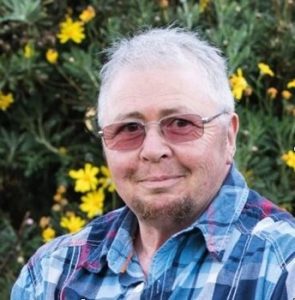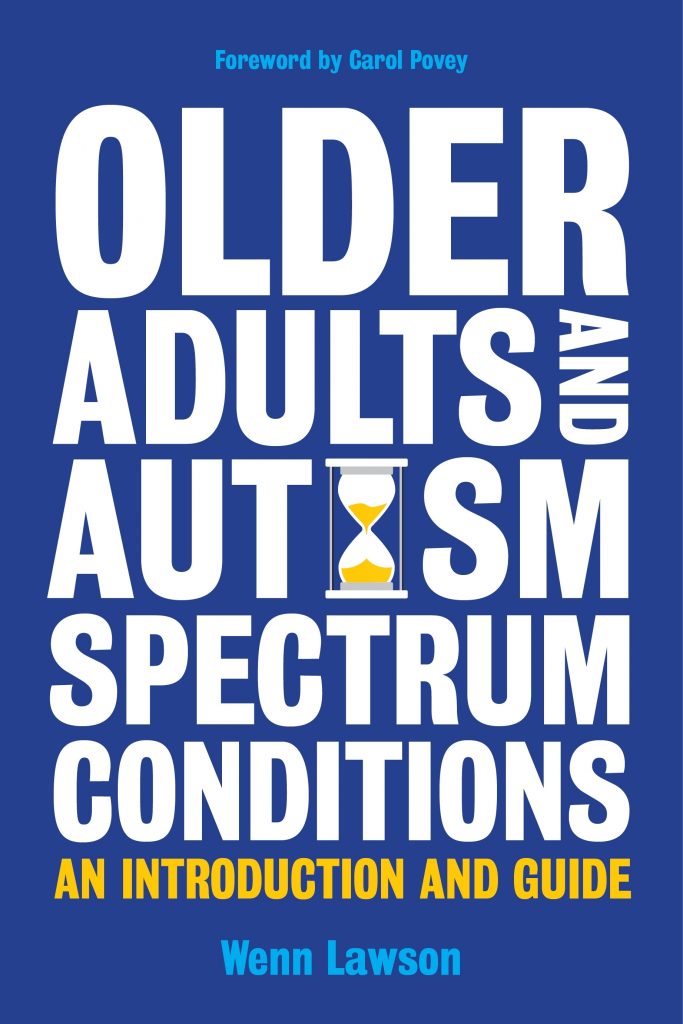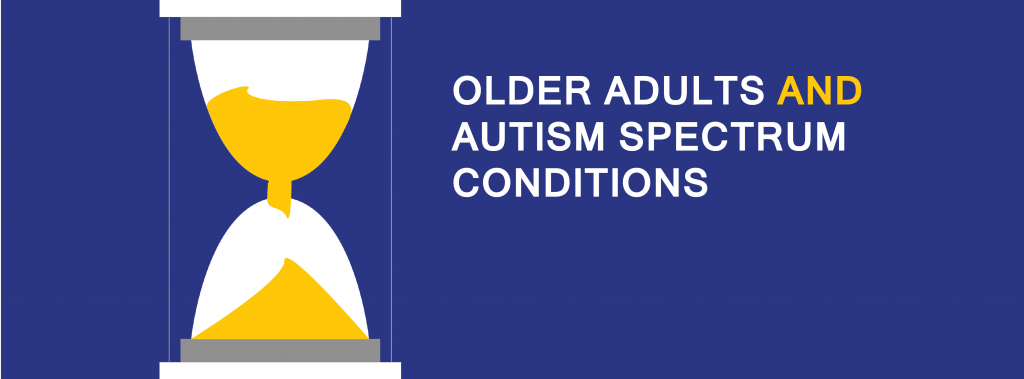The latest in our blog series for Autism Awareness Month, we’re looking at Wenn Lawson’s excellent book for autistic adults. The first book to look seriously at the practical issues facing older adults with autism, Wenn Lawson’s groundbreaking handbook Older Adults and Autism Spectrum Conditions offers support, advice, and sensible ways in which to look at the issues. In this extract, Wenn uses himself as a case study.
As I’ve aged, I’ve noticed a few changes related to ASC that are relevant to this discussion. I’ve divided them into physical setting, emotional wellbeing and social setting, though clearly each overlap.
Physical setting
This broad topic includes health and mobility at home, outside home, at work, using public transport, and visiting family and friends.
As I’ve become older the sensory issues I live with have worsened. The impact on me of noise (from conversation, TV, radio), clutter (too much stuff in the room, or on a shelf), physical demands (walking, bending, feeding my cats) and the expectation that I can multi-task (look and listen at the same time) have all increased. They can be more overwhelming and leave me more tired and irritable than when I was younger. The need for order has also increased as I have aged. This is because when things are ordered there is less demand on my processing abilities. If things get ‘out of order’ it almost immobilises me.
Just like any other ageing individual I have increased mobility issues as my knees and back have become very arthritic. Living with ASC and ageing makes simple transport strategies more difficult than for non-ASC ageing individuals. For example, if I need to take public transport or ride a taxi, the chatter from others, having the radio on and the bus bell are all difficult to cope with because they require joint attention, which is too demanding for me. I wish I could ‘turn them off’. Sometimes I don’t go out into the community even to shop for things I need because I can’t control, and therefore fear, the outside physical environment. When I do venture outside, I often need earplugs or a head-set or I go at times when town and shops are less busy so there are fewer people and less demand on me. These take the edge off noise and make going out a bearable task.

Sight loss, hearing loss and loss of strength or stamina to do things is becoming more noticeable, which is very depressing. These ailments also mean I need more visits to the doctor and hospital. If, as ASC ageing individuals, we have to go to a hospital for any surgical procedure this must be clearly planned, explained and executed.
In general the difficulty for people with ASC relates to forward thinking and our tendency to be very literal. The whole doctor/hospital event will be fraught with difficulty. What will it mean if our appointment time says one thing but we are not warned that this is only a guide? What if medical staff don’t appreciate that an ASC individual may be tactile defensive and will be extremely upset if someone attempts to touch them?
All concepts need to be explained to individuals and to their supporters. Follow-up plans must also be clearly spelt out. For some people, putting these into words may not be adequate communication. Individuals might do better with a story, pictures and even video to explain what is likely to happen. I love making short video messages as I process information, remind myself of appointments or just record an event. If I wish I can email these to myself and to others.
Emotional wellbeing
In general I do better with space and quietness. Also, I need support from people who help by explaining concepts and what’s about to happen. My emotional wellbeing often depends upon my being able to attend to things that interest me. For example, I can be heard laughing to myself as I watch the antics of the colourful parrots in my garden.

Even though I have a PhD and will happily give a lecture or facilitate a workshop, I still need support crossing busy roads, getting the shopping done or filling in forms for authorities. I also need clear explanations of what might be happening to/for me and for others. This can be presented via social video stories or sharing concerns via TV programmes. (For example, Google and YouTube are great, because they don’t have overwhelming facial expressions or body language.) These two-dimensional images seem to require less processing than three-dimensional interaction, while at the same time offering all the information I need.
I need to rest and have time away from emotional demand. Without this I can become moody, less communicative and more likely to react in negative ways to demands, such as through fatigue or headaches. This might seem like a common issue for anyone, but the size of the response will be different from that seen in older NT individuals. For example, older people with ASC might simply close down and not be able to tell you what’s happening. Some might become loud, aggressive or totally withdrawn.
Social setting
Some of us really need other people in our lives on a daily basis, but their presence needs to be structured into our day and not thrust suddenly upon us. The older I get the more I need these structures and routines. It’s not like in typical older people needing the occasional reminder or liking to sit on the same comfy chair. My need for structure extends to clothing, what I eat, my TV viewing, what I say and in what order things need to be done. If it’s not done exactly to routine many of us can be upset (close off to all communication) for the entire day. It’s as if we needed ‘that thing’ in order to know what ‘the next thing’ is.
I don’t need as much social contact as some might, and I like time to myself. This need for quiet time has increased as I have gotten older. Again, the difference for me compared with an older NT is that I might last ten minutes over a coffee and a chat before I notice my senses shutting down. Then I’ll get up and move away. There isn’t time for explanations or small talk. Even a small amount of ‘social’ can be overwhelming. It can cause my mind to feel as if it’s going to explode! Needing a clear beginning and a clear ending to social situations is important to helping us cope.
Doing ‘social’ is very tiring and I’m not being anti-social when I request limited interaction with a group (even family). I require more time to process social interaction, and more time to recover from social activity, than a typical older person.
- If you would like to read more articles like this and get the latest news and offers on our books about autism, why not join our mailing list? We can send information by email or post as you prefer. You may also be interested in liking our Autism, Asperger’s and related conditions Facebook page.
- For more blogs in this series, you can read Anxiety and the Autism Spectrum, An Adult with an Autism Diagnosis, or Aging on the Autism Spectrum.
